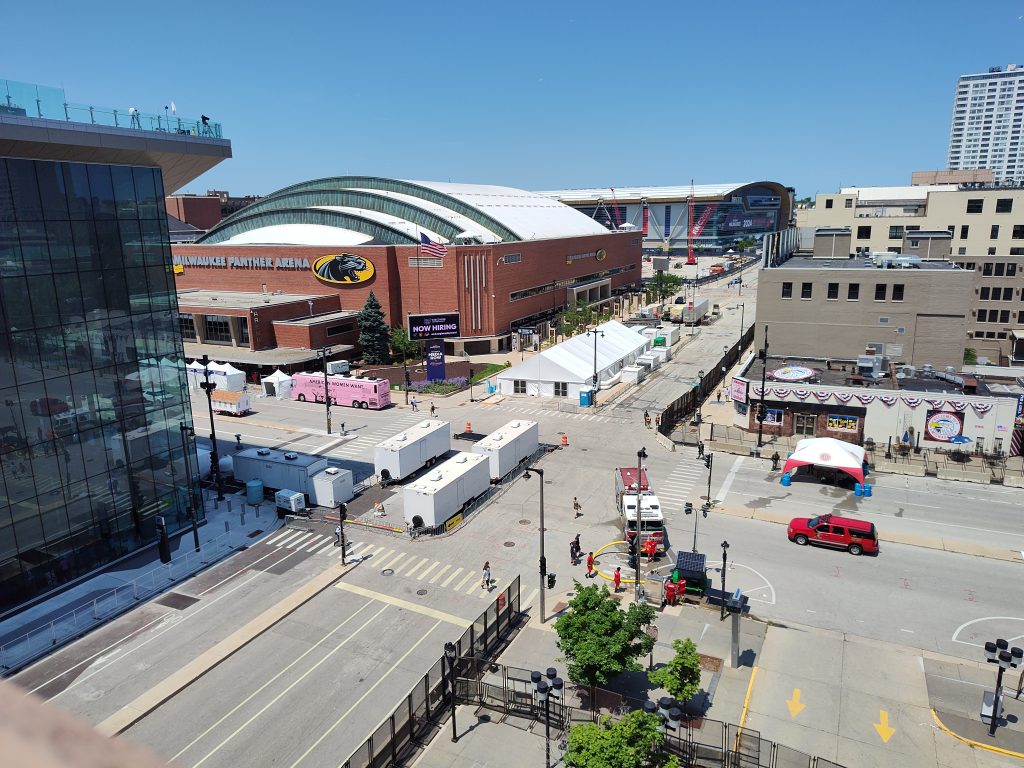Podcast: Play in new window | Download | Embed
The Republican National Convention is still set to begin Monday in Milwaukee, despite the Saturday shooting that wounded presumptive GOP presidential nominee Donald Trump.
Chuck Quirmbach of station WUWM reports tribes will have a presence at the RNC.
The Forest County Potawatomi tribe is part of the Host Committee for the Milwaukee convention, and at least one event is planned at their local casino.
Other tribes are sending representatives to network with Republican politicians and delegates.
Ho-Chunk Nation President Jon Greendeer says, for one thing, it’s important to remind the convention that much of southern Wisconsin was once Ho-Chunk territory. But President Greendeer says there will also be discussions about current issues.
“There’s a few things that are very similar to what non-tribal communities are dealing with. And that is, housing needs, it’s technology and broadband access. It is food security. It is response to any opioid or addiction crises. It is infrastructure.”
President Greendeer says he believes those concerns hit Indian Country harder, because of less access to economic development and public services.
He says there may be a push in Congress to give the tribes control over more of their gaming revenue, to meet tribal needs.
The Oneida Nation will also have a representative at the RNC.
Vice-Chairman Brandon Yellowbird-Stevens says one message he hopes the tribe gets across is one of sovereignty, including that Native people should have more say-so in use of federal funds they receive.
“That can relate to any and all initiatives on reservations. So, that’s health care, education, housing, economic development. And so we have that foundational argument going to Congress and those who have the purse strings.”
The tribal leaders say they also expect to send representatives to next month’s Democratic National Convention in Chicago.
A courtroom in Manitoba erupted in celebration after a judge found serial killer Jeremy Skibicki guilty in the killings of four Indigenous women.
As Dan Karpenchuk reports, family members of the victims say they hope this will bring closure.
Many of those family members and friends continued their celebration on the street outside the courthouse after the guilty verdict.
Jeremy Skibicki was found guilty of first degree murder in the gruesome killings of Morgan Harris, Marcedes Myran, Rebecca Contois, and an unidentified woman who was given the name of Buffalo Woman.
Skibicki preyed on Indigenous women at homeless shelters, a crime the prosecution claimed was racially motivated.
The judge refused to believe the defense argument that Skibicki was not criminally responsible because of a mental illness.
Robert Karass is a criminal defense lawyer.
“The man’s a serial killer and he’s trying to get away with murder by arguing that he lacked the ability of knowing right from wrong, not legally but morally. It was a long shot at best. Defense lawyers sometimes need to follow their client’s advice and instructions and move forward with a defense even if they may not even believe in it themselves, because that’s the client’s instruction. But what I can say is that I think the conviction is entirely appropriate.”
First degree murder convictions carry an automatic life sentence with no parole for 25 years.
No date has yet been set for Skibicki’s sentencing hearing.
Manitoba Premier Wab Kinew says the next step must be the searching of a landfill north of Winnipeg to find the remains of two of the victims.
That process is expected to begin in the fall.
Get National Native News delivered to your inbox daily and stay up-to-date on the 2024 Native Vote. Sign up for our daily newsletter today.




